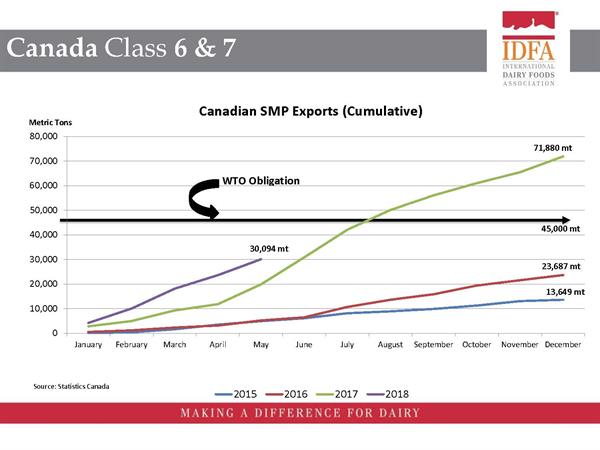Dairy organizations and policymakers in the United States, Australia, the European Union, Mexico and New Zealand have repeatedly expressed indignation about Canada’s actions to deepen its already prohibitive restrictions on dairy trade. Canada’s increasingly protectionist policies violate international trade obligations, hold out the prospect of trade diversion with attendant global price-depressing impacts and conflict with the principles of free markets and fair and transparent trade.
In the United States, IDFA joined the National Milk Producers Federation, the U.S. Dairy Export Council, and the National Association of State Departments of Agriculture in opposing the recently implemented Canadian National Ingredient Strategy, which provides monetary incentives to Canadian processers to encourage them to use Canadian dairy inputs and discourage use of imported U.S. ultra-filtered milk. The impact of this strategy applied in just one province, Ontario, is conservatively estimated at $150 million worth of ultra-filtered milk exports being lost by companies in Wisconsin and New York. The national strategy will have much more harmful effects beyond ultra-filtered milk and into WTO-violating skim milk powder subsidies.
The National Ingredient Strategy, which was implemented on Feb. 1, 2017, artificially lowers milk ingredient prices for Canadian producers through the creation of a new ingredient class and price controls for milk powders and milk protein concentrates (MPC), among other dairy ingredients.
The ingredients strategy, which was originally launched as a provincial measure in Ontario in April 2016, provides monetary incentives to Canadian processors to encourage them to use Canadian dairy inputs and discourages the use of imported U.S. ultra-filtered milk. The impact of this provincial strategy is conservatively estimated at $150 million worth of ultra-filtered milk exports being lost by companies in Wisconsin and New York.
The ingredients strategy on the national level mirrors the Ontario provincial program in many respects. It established a new ingredient milk Class 7 to be priced at the lowest of the US, EU and Oceania price for solids-not-fat for 7 years. As such, the program provides both an incentive to substitute those ingredients over imports and a subsidy on the production of the end products containing said ingredients.
As seen in the graph below, this strategy also enables the export of Canada’s structural surplus of skim milk powder (SMP) at below the cost of production and an increase of SMP exports in a way that would violate Canada’s World Trade Organization (WTO) export subsidy commitments. Furthermore, the additional large volumes of skim milk powder forced onto the thinly traded global market would result in a further depression of prices that will negatively impact the revenues of dairy farmers around the world.

The unfair trade barriers under the National Ingredient Strategy compound the current expansive protections granted to Canadian producers and processors. For example, Canada’s compositional standards for cheese intentionally limit imports of dairy ingredients, such as casein or whey protein concentrate. In addition, tariff-rate quotas allow only a small amount of dairy imports into the country before they are slapped with a minimum 200-percent tariff; fluid milk and cream are automatically subjected to the out-of-quota rate thanks to the erroneous belief that “cross-border shopping” fills the quota level.
These policies – from the ingredient strategy to the supply management system – directly contradict Canada’s WTO obligations and market access commitments. Because of these contradictions, IDFA continues to urge the United States government, in coordination with other affected countries, to initiate WTO dispute-settlement proceedings against Canada to enforce free, fair and transparent trade.
IDFA and its partners have also successfully worked to gain the attention of policy makers: Senators Charles Schumer (D) and Kirsten Gillibrand (D) of New York both highlighted the seriousness of the issue; In October 2016, IDFA joined a letter with Governor Andrew Cuomo of New York to Canadian Prime Minister Justin Trudeau condemning the ingredient strategy; and in February 2017, Speaker of the House Paul Ryan made it a key issue in his meetings with both PM Trudeau and Canadian Foreign Minister Chrystia Freeland.
IDFA has also sought to make it a top priority for the Trump administration. In January 2017, U.S. dairy organizations and the state departments of agriculture across the country told President Trump that Canada’s protectionist policies are intentionally designed to block imports from the United States and violate Canada’s trade commitments under the North American Free Trade Agreement (NAFTA) and the World Trade Organization. IDFA, the National Milk Producers Federation, the National Association of States Departments of Agriculture and the U.S. Dairy Export Council urged the president-elect and his key cabinet members to take immediate action.
The letter to Trump outlined estimates from the U.S. Department of Agriculture that show each $1 billion of U.S. dairy exports generates more than 20,000 jobs for Americans and almost $3 billion of economic output. U.S. dairy suppliers are reporting that they are already losing business because of these programs, demonstrating that Canada’s actions are resulting in lost revenues and jobs for dairy farmers and processors across the United States.
In April 2017, upon the implementation of the strategy, IDFA, the National Milk Producers Federation and the U.S. Dairy Export Council called on the federal government, and on governors in northern states, to take immediate action in response to Canada's violation of its WTO commitments. “IDFA is speaking out against Canada’s protectionist policies on Capitol Hill, and asking the Trump Administration and state governors and legislators to insist that Canada honor its trade commitments and allow more market access for U.S. dairy products,” said Michael Dykes, D.V.M., president and CEO of IDFA.
Joined by the National Association of State Departments of Agriculture, the aforementioned organizations request that the president: “contact Prime Minister Trudeau to request that this Class 7 program be halted and that ultra-filtered milk imports from the United States be restored; direct U.S. agencies to examine the full range of tools that could be used immediately to impress upon Canada in a concrete way the importance of dependable two-way trade; and make opening Canadian dairy market access and addressing the chronic use of non-tariff tools to thwart trade a key and early-stage priority in NAFTA discussions.” Read more details on the joint letter to President Trump here.
The U.S., Australia, the European Union, and New Zealand have repeatedly probed Canada for more information, transparency and honesty on the intended effects of the policy at the WTO, but have not yet initiated any formal dispute settlement negotiations.
The new pricing policy by Canada is leaving farmers and processors without a market, and spurred the Wisconsin agriculture secretary and the New York agriculture commissioner to request that USDA purchase surplus cheese and butter. If not alleviated, the policy will continue to harm U.S. farmers, processors and taxpayers as well as Canadian consumers.

Senior Vice President of Legislative Affairs and Economic Policy